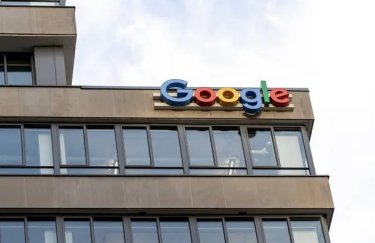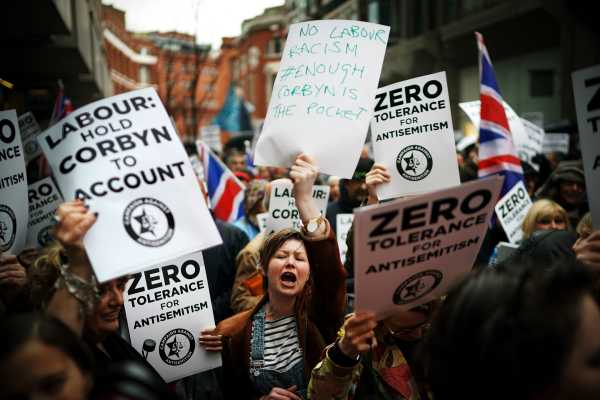 UK Labour Party apart, explained” alt=”The anti-Semitism crisis tearing the UK Labour Party apart, explained” />
UK Labour Party apart, explained” alt=”The anti-Semitism crisis tearing the UK Labour Party apart, explained” />
The anti-Semitism crisis tearing the UK Labour Party apart, explained
Labour leader Jeremy Corbyn is being accused of mishandling claims of anti-Semitism in the party.
By
Darren Loucaides
Mar 8, 2019, 7:00am EST
Share
Tweet
Share
Share
The anti-Semitism crisis tearing the UK Labour Party apart, explained
tweet
share
LONDON — The UK’s Labour Party is in the midst of a full-blown anti-Semitism crisis.
Recently, nine members of Parliament (MPs) quit the center-left party in protest of the current leadership, citing their handling of allegations of anti-Semitism as well as dissatisfaction over the party’s stance on Brexit.
“I cannot remain in a party that I have today come to the sickening conclusion is institutionally anti-Semitic,” Labour MP Luciana Berger said at a February 18 press conference explaining her decision to leave. Berger, who is Jewish, has received a torrent of anti-Semitic abuse online over the past few years.
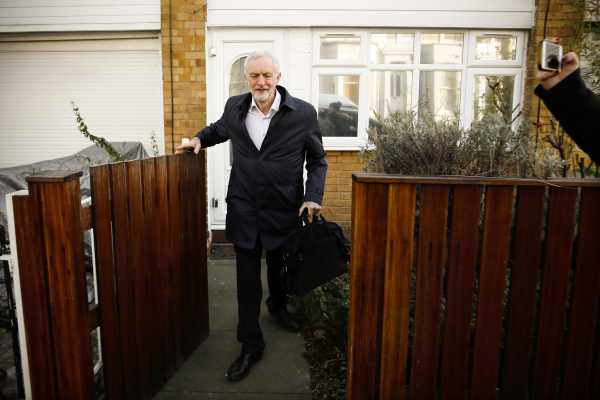
While rumors have circulated for months about a possible Labour split due to the UK’s upcoming, chaotic divorce from the European Union, the resignations — particularly Berger’s — sent shock waves through the party, and many felt that the party leadership should have done more to protect Berger from the abuse she’d been receiving.
If you’re wondering how the situation has escalated to this point, don’t worry. We’ve got you covered.
The anti-Semitism controversy in the Labour Party is fairly recent
The UK Labour Party, which dates back to 1900, was long seen as the party of the working classes. Throughout most of its history, Labour has stood for social justice, equality, and anti-racism.
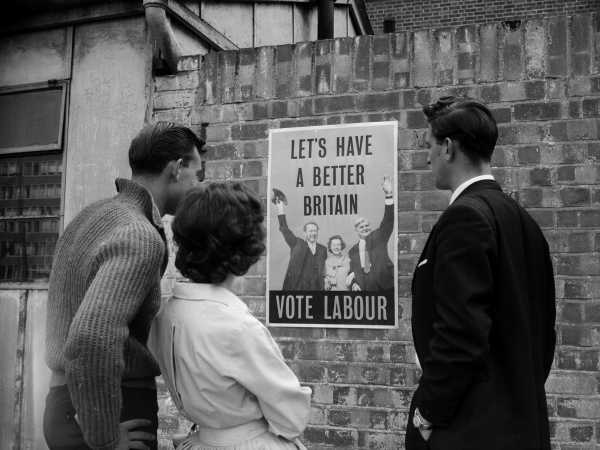
Labour’s controversy over anti-Semitism is fairly recent. It’s often traced back to 2015, when Jeremy Corbyn became the party leader. Corbyn, seen as on Labour’s left wing, has long defended the rights of Palestinians and often been more critical than the party mainstream of Israel’s government.
But during the Labour leadership contest in 2015, a then-senior Jewish Labour MP said that Corbyn had in the past showed “poor judgment” on the issue of anti-Semitism — after Corbyn unexpectedly became the frontrunner in the contest, a Jewish newspaper reported on his past meetings with individuals and organizations who had expressed anti-Semitic views.
Concerns over anti-Semitism only really began to turn into a crisis, however, the year after Corbyn became leader. In April 2016, a well-known right-wing blog revealed that Labour MP Naz Shah had posted anti-Semitic messages to Facebook a couple of years before being elected.
One post showed a photo of Israel superimposed onto a map of the US, suggesting the country’s relocation would resolve the Israeli-Palestinian conflict. Above the photo, Shah wrote, “Problem solved.”
Shah apologized, but former Mayor of London Ken Livingstone, a long-time Labour member who was close to party leader Jeremy Corbyn, made things worse by rushing to Shah’s defense — and added an inflammatory claim that Hitler initially supported Zionism, before “he went mad and ended up killing six million Jews.”
The party suspended Shah and Livingstone and launched an inquiry into anti-Semitism. But Corbyn was criticized for not acting quickly or decisively enough to deal with the problem. Afterward, claims of anti-Semitism kept resurfacing as individual examples were dug up across Labour’s wide membership.
By now a narrative was building that anti-Semitism was rife within the party — and that the election of Corbyn as leader was the cause.
The unlikely rise of Jeremy Corbyn
Jeremy Corbyn became Labour’s leader in 2015, to pretty much everyone’s surprise.
The 69-year-old became politically active in his 20s and had been a so-called “backbencher” — an MP without an official position in the government or the opposition parties — since 1983.
Throughout his political career, Corbyn has protested against racism and backed left-wing campaigns such as nuclear disarmament, and was considered the long shot in the party’s leadership contest — bookmakers initially put the chance of him winning at 200 to 1.
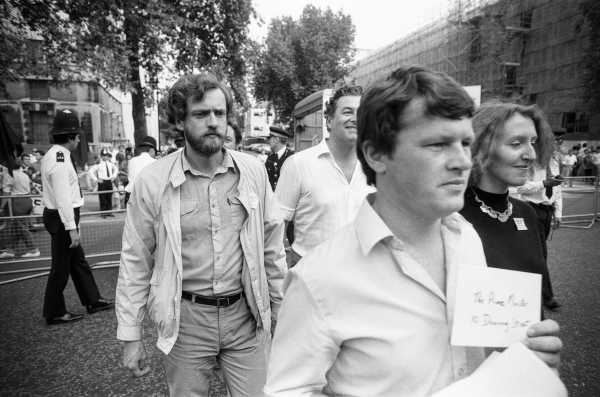
The three other candidates were considered centrist or center-left. Two had served in government during the New Labour era, when Tony Blair swung the party to the center ground. Corbyn’s victory confirmed that the New Labour project was dead.
Some MPs later admitted they only backed him as one of the leadership candidates so that a representative of the party’s left-wing would be on the ballot; they never thought he would win.
Corbyn’s campaign drummed up a big grassroots following as his anti-austerity, socialist message gained traction, in a way that would later be echoed by Bernie Sanders’s 2016 campaign in the US.
Shocking the establishment and against all odds, Corbyn went on to decisively win the leadership contest. When, the following year, MPs on the right of the party revolted and forced a leadership contest, Corbyn yet again won convincingly.
Ever since Tony Blair helmed the party from 1994 to 2007, Labour had been dominated by more centrist than left-leaning MPs. Under Blair, Labour embraced neoliberal economics alongside more traditionally liberal social policies, such as a minimum wage.
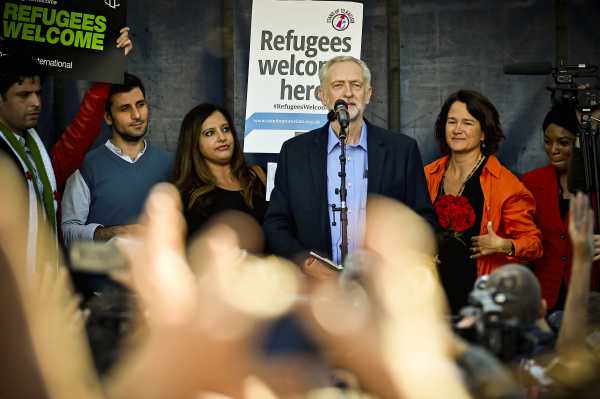
But after Corbyn’s unexpected win, everything changed. Corbyn steered the party to the left on many issues, including proposals to nationalize the railways and possibly the energy companies, end the era of slashing state spending, and tax the rich.
He also moved the party leftward on Israel and Palestine.
Labour’s previously moribund membership boomed to half a million, making it one of the biggest political parties in Europe. The many newcomers were attracted by the chance to support a truly left-wing Labour Party.
Claims of anti-Semitism also increased: Labour’s general secretary revealed that between April 2018 and January 2019, the party received 673 accusations of anti-Semitism among members, which had led to 96 members being suspended and 12 expelled.
Part of the reason anti-Semitism claims have grown under Corbyn is that his wing of the party — the socialist left — tends to be passionately pro-Palestine. There is nothing inherently anti-Semitic about defending Palestinians, but such a position can lead to tensions between left-wing anti-Zionists and mainstream Jewish communities.
This tension has at times led to a tendency on the left to indulge in anti-Semitic conspiracy theories and tropes — like blaming a Jewish conspiracy for Western governments’ support of Israel or equating Jews who support Israel with Nazi collaborators.
Corbyn’s defenders point out that the media has inordinately focused on Labour while giving less attention to cases of racism and Islamophobia among the Conservatives and other parties. But if it wasn’t clear already, recent events have confirmed that anti-Semitism is a crisis for Labour.
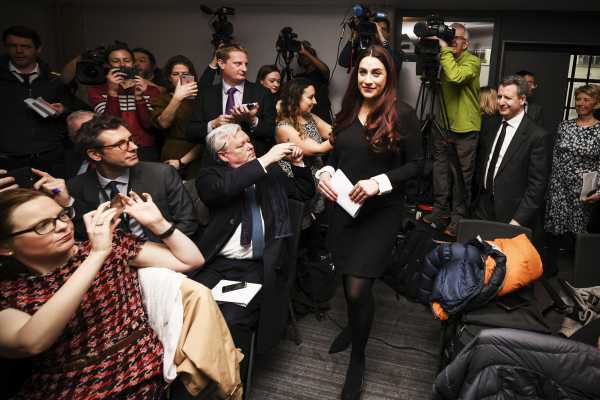
Many of the MPs who resigned from Labour two weeks ago had long been threatening to go, and have deeply held political differences with Labour’s more radically progressive leadership. But Luciana Berger resigned because of anti-Semitism, and Labour’s failure to prevent her from leaving on this count is impossible to ignore.
Is Corbyn to blame for Labour’s current crisis?
At first glance, Corbyn hardly seems like someone who would be an enabler of anti-Semitism.
He has a long history of campaigning against racism — for instance, in the 1980s, he participated in anti-apartheid protests against South Africa, at the same time that former Conservative Prime Minister Margaret Thatcher was calling Nelson Mandela’s African National Congress opposition movement a “typical terrorist organization.”
And he has long campaigned for Palestinian rights, while being critical of the government of Israel — including comparing Israel’s treatment of Palestinians to apartheid.
But Corbyn’s anti-imperialist, anti-racist stance over the years has also led some to label him a terrorist sympathizer. Corbyn in the past advocated for negotiations with militant Irish republicans. As he did with Irish republicans, Corbyn encouraged talks with the Islamist militant groups Hamas and Hezbollah.
He has also been heavily criticized for having previously referred to these groups as “friends,” which caused outrage when publicized during 2015’s Labour leadership contest. Corbyn explained that he had only used “friends” in the context of trying to promote peace talks, but later said he regretted using the word.
Last March, Corbyn was also criticized for a 2012 comment on Facebook, in which he had expressed solidarity with an artist who had used anti-Semitic tropes in a London mural that was going to be torn down.
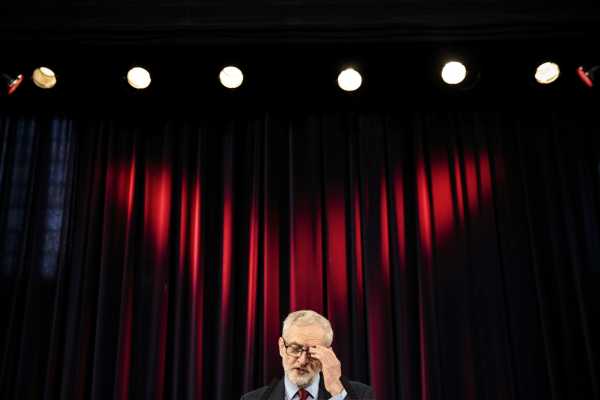
After Luciana Berger tweeted about the post and demanded an explanation from the Labour Party leadership, Corbyn said that he “sincerely regretted” having not looked at the “deeply disturbing” image more closely, and condemned anti-Semitism.
A few days later, Jewish groups gathered outside the UK Parliament to demonstrate against anti-Semitism. The Jewish Leadership Council, an umbrella organization for several Jewish groups and institutions in the UK, said that there was “no safe space” in the Labour Party for Jewish people.
“Rightly or wrong, Jeremy Corbyn is now the figurehead for an anti-Semitic political culture, based upon an obsessive hatred of Israel, conspiracy theories and fake news,” the chair of the Jewish Leadership Council, Jonathan Goldstein, said at the time.
The crisis didn’t end there. In August 2018, the right-wing British newspaper the Daily Mail accused Corbyn of having laid a wreath at the graves of the Palestinian terrorists while in Tunisia in 2014.
Corbyn acknowledges that he participated in a wreath-laying ceremony at a Tunisian cemetery in 2014, but says he was commemorating the victims of a 1985 Israeli airstrike on the headquarters of the Palestinian Liberation Organization (PLO), who were living in exile in Tunis at the time. The airstrike killed almost 50 people, including civilians, and wounded dozens more.
However, the Daily Mail published photos showing Corbyn holding a wreath not far from the graves of four Palestinians believed to be involved with the 1972 Munich massacre, in which members of the Black September terrorist organization killed 11 Israeli athletes and a German police officer at the Munich Olympics.
Corbyn denies he was commemorating the latter individuals, but his muddled explanations in the wake of the controversy left some unsatisfied with his response.
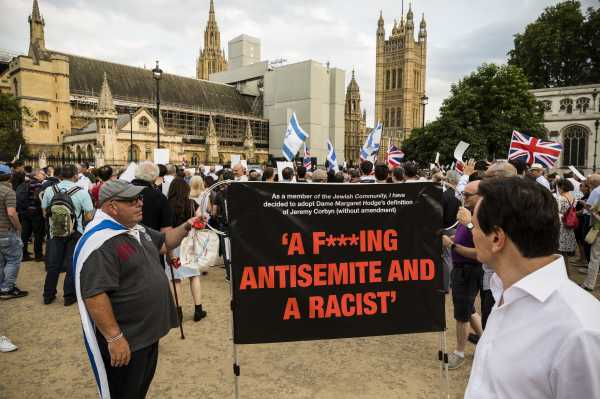
Today, on social media, it is common to see Corbyn denounced for enabling anti-Semitism — author J.K. Rowling has even criticized him for it — while some brand him outright as an anti-Semite. When US Rep. Alexandria Ocasio-Cortez (D-NY) recently tweeted that she’d had “a lovely and wide-reaching conversation” with Corbyn by phone, hundreds of commenters criticized her for speaking to Labour’s “anti-Semitic” leader.
Corbyn’s defenders argue that there is no clear evidence that he — a lifelong campaigner against racism — is anti-Semitic.
“My mother was a refugee on the Kindertransport, and a massive friend of Corbyn — they worked terribly closely together, doing all sorts of political things to support communities in North London,” Annabelle Sreberny, emeritus professor at SOAS University of London and member of Jewish Voice for Labour — a small organization that tends to deny Labour has a problem with anti-Semitism — told me. “So the idea that he himself is an anti-Semite is just a pathetic smear.”
Sreberny told me she largely sees the portrayal of Corbyn’s Labour Party as “institutionally anti-Semitic” — which is how Berger put it when she resigned — as part of a calculated political campaign against Corbyn and his left-wing agenda.
And indeed, this perception may have actually contributed to the current crisis.
Michael Segalov, a journalist who has written and spoken extensively on this issue, told me he thinks that part of the reason Corbyn and the Labour leadership were initially slow to react to anti-Semitism was that the claims were wrongly interpreted as part of a sustained, wider campaign of personal and political attacks against Corbyn.
But like Segalov, there are many in the Labour Party who strongly disagree with the idea that the accusations of anti-Semitism are merely a political smear campaign. A poll carried out by the Jewish Chronicle newspaper in the summer of 2018 found more than 85 percent of British Jews believe Corbyn himself is anti-Semitic, and a similar number believe the level of anti-Semitism in the Labour Party is “high” or “very high.”
Jon Lansman, founder of the pro-Corbyn campaign group Momentum and now a member of Labour’s national executive committee, recently told the BBC’s Radio 4 that there were many more Labour members who held “hardcore, anti-Semitic opinions” than previously thought. Lansman, who is Jewish, also said that he felt “regret, sadness and some shame” about Berger’s resignation from the party.
Where does Labour go from here?
There seems to have been a major shift in the perspectives of party leaders since the resignation of the nine Labour MPs.
Labour’s deputy leader Tom Watson, who is seen as a centrist, recently told the BBC that he thought if Corbyn took “a personal lead” in examining accusations of anti-Semitism, it could make a big difference. Watson said that just last week, he had received a dossier from parliamentary colleagues of 50 complaints on anti-Semitism that he felt had not been dealt with adequately, and had passed them on to Corbyn.
Corbyn, perhaps heeding Watson’s advice, is in talks to appoint former Lord Chancellor Charlie Falconer to be an independent reviewer tasked with ensuring that anti-Semitism claims within the party are handled more effectively. Falconer held high office from 2003 to 2007 under Blair’s government and is respected across the party.
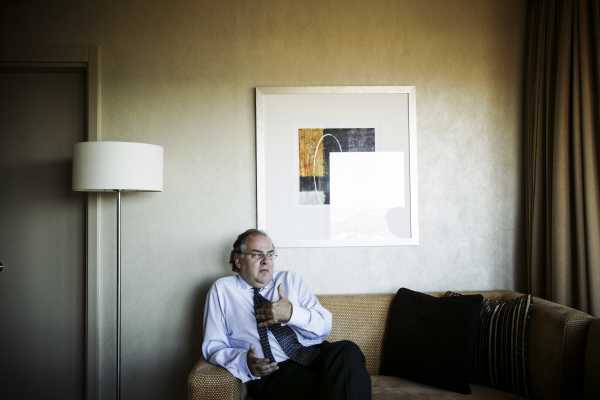
The recent split could prove a turning point for Labour in terms of addressing anti-Semitism as well as wider divisions within the party. “I think [Corbyn] understands now that if he is ever to be prime minister, he needs to rebuild that trust [with the British Jewish community],” said Watson, who urged the quick expulsion of members who’d made anti-Semitic comments. But as Watson added: “Time is against us.”
Indeed, urgency is needed for Labour’s leadership to effectually tackle the party’s anti-Semitism crisis and convince other MPs not to quit. The nine MPs who’ve left have formed the Independent Group, an informal assemblage that plans to launch as an official political party before the end of the year. Several other Labour MPs are rumored to be thinking of joining them.
Unless Labour moves fast, the emerging centrist party could prove an existential threat.
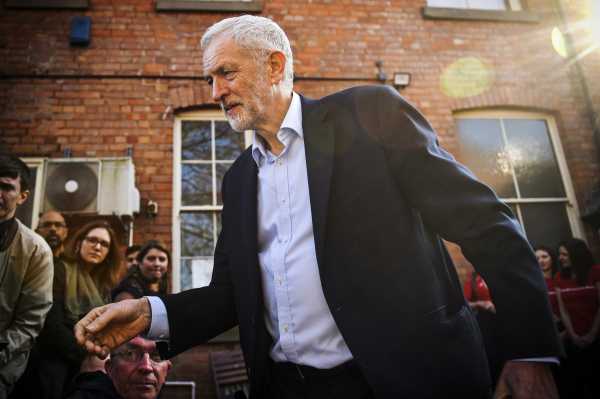
Darren Loucaides is a British writer who covers politics, populism, and identity. Find him on Twitter @DarrenLoucaides.
Sourse: vox.com
